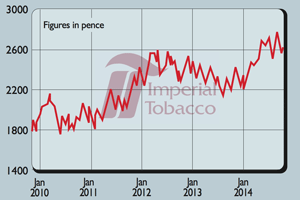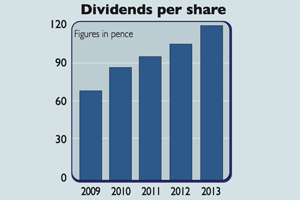Shares in focus: Imperial Tobacco – a safe haven in a rocky market
Imperial Tobacco is defying the sceptics, so is it worth paying up for the shares? Phil Oakley investigates.
Get the latest financial news, insights and expert analysis from our award-winning MoneyWeek team, to help you understand what really matters when it comes to your finances.
You are now subscribed
Your newsletter sign-up was successful
Want to add more newsletters?

Twice daily
MoneyWeek
Get the latest financial news, insights and expert analysis from our award-winning MoneyWeek team, to help you understand what really matters when it comes to your finances.

Four times a week
Look After My Bills
Sign up to our free money-saving newsletter, filled with the latest news and expert advice to help you find the best tips and deals for managing your bills. Start saving today!
Imperial Tobacco is defying the sceptics and its dividend is worth pocketing, says Phil Oakley.
Imperial Tobacco is one of the world's largest tobacco companies. While it is somewhat in the shadow of global giants such as Philip Morris and British American Tobacco, it has a stable of brands that have made it a decent stockmarket performer in recent years John Player Special, Gauloises, Rizlaand Golden Virginia, to name but a few. The company also has a good trackrecord of paying decent dividends that keep on rising.
Yet investing in tobacco will always be controversial. I can perfectly understand why people would not want to put their money into a business such as Imperial Tobacco on ethical grounds.
MoneyWeek
Subscribe to MoneyWeek today and get your first six magazine issues absolutely FREE

Sign up to Money Morning
Don't miss the latest investment and personal finances news, market analysis, plus money-saving tips with our free twice-daily newsletter
Don't miss the latest investment and personal finances news, market analysis, plus money-saving tips with our free twice-daily newsletter
What's more, tobacco stocks may not offer a wholly reliable source of income in the future. Companies such as Imperial Tobacco are constantly under pressure from governments, while competition remains tough. So are Imperial Tobacco's shares worth paying up for, or should you give them a wide berth?
The outlook
Tobacco shares always seem to be climbing the wall of worry. It's not difficult to see why. In the Western world, fewer and fewer people are smoking, while governments seem intent on milking the industry for as much money as they can without killing it off completely.
Ed Miliband is openly talking about bashing the tobacco companies if he becomes prime minister. Then there's the growing trend in illegal cigarettes, which now account for around 10% of the total number smoked across the world. This is a particular problem in less prosperous countries, where cash-strapped smokers find illegal cigarettes increasingly tempting.
Against this backdrop, you'd think tobacco companies would find it hard to make money. And to an extent, they do, but they've proved remarkably resilient and have looked after their shareholders well. Since 2009, Imperial Tobacco has increased its dividend per share by 73% and has promised to increase this year's payout by at least 10%.
What if Europe falls into recession?
However, the worry with Imperial is that it is reliant on Europe for a huge chunk of its profits nearly two-thirds last year. Consumers in southern Europe are buying more cigarettes on the black market and the volumes Imperial Tobacco sells are falling sharply. Up until recently, it's been able to jack up selling prices to offset this, but it couldn't stop underlying sales falling in the first half of 2014. But the really worrying question is what would happen to the company if Europe's economies slide back into recession. Its aim here is to hold on to as much of its current profits as it can in the years ahead.
Imperial Tobacco knows that Europe isits Achilles heel and is trying to do something about it. Unsurprisingly, that means cost cutting. Imperial Tobacco is aiming to take £300m of costs out of the business by 2018 and looks to be on track to do this. It is also taking a close look at how many cigarettes it ties up in stock.
It seems that Imperial Tobacco has stuffed its distribution channels with too many of them in the past, which has taken up a significant amount of cash investment. Cutting stock levels is hurting sales in 2014, but should boost company cash flows in 2015 and 2016.
It is also focusing more of its resources where it can still sell more cigarettes, such as parts of Asia, the Middle East and the US. In America, it has just done a deal to take on some brands from Lorillard, which will see its market share increase from around 3% to nearer 10% for an outlay of around £4.4bn ($7.1bn).
Imperial Tobacco will also get its hands on the leading e-cigarette brand Blu, which is having a hard time at the moment as its patents are being challenged. That said, expanding in America could work out well for Imperial Tobacco and it will reduce its reliance on Europe to around 55% of its profits from 2016.
But this American strategy needs to pay off as Imperial Tobacco is financing it by taking on extra borrowings, which will add to its already substantial pile of debt. The interest bill is only covered twice by operating profits, which leaves little room for error.
Then there's the fact that Imperial Tobacco shares don't really look that cheap, especially as profits are only expected to grow modestly in 2014.
A forward price/earnings ratio of just under 13 times may not look too expensive, but when the company's large debts are taken into account its earnings yield is lower than you might expect a 6.4%. That suggests the shares are fully valued.
Should you buy the shares?
So given all the risks facing the business and the price of the shares, why on earth would you consider buying them now? The main reason would be for its dividend income and the company being seen as a relatively safe haven if markets get rocky again. The shares offer a decent yield of 4.9% based on the forecast 2014 payout, while analysts are pencilling in another chunky increase in 2015.
Imperial and its peers have defied the sceptics for a long time and may keep on doing so for a while yet. Don't expect to make a lot of money owning these shares, but the dividend may be worth pocketing for the next couple of years.
Verdict: buy for dividend income
Imperial Tobacco (LSE: IMT)


Buy: 13
Hold: 8
Sell: 5
Target price: 2,700p
Directors' shareholdings
A Cooper (CEO): 162,111
O Tant (CFO): 829
M Williamson (Chair): 8,241
Get the latest financial news, insights and expert analysis from our award-winning MoneyWeek team, to help you understand what really matters when it comes to your finances.
Phil spent 13 years as an investment analyst for both stockbroking and fund management companies.
-
 Should you buy an active ETF?
Should you buy an active ETF?ETFs are often mischaracterised as passive products, but they can be a convenient way to add active management to your portfolio
-
 Power up your pension before 5 April – easy ways to save before the tax year end
Power up your pension before 5 April – easy ways to save before the tax year endWith the end of the tax year looming, pension savers currently have a window to review and maximise what’s going into their retirement funds – we look at how
-
 Imperial Brands has an 8.3% dividend yield – but what’s the catch?
Imperial Brands has an 8.3% dividend yield – but what’s the catch?Tips With an impressive dividend yield of 8.3%, Imperial Brands looks to be one of the most attractive income stocks in the FTSE 100 . But investors should beware, says Rupert Hargreaves. Imperial’s stock looks cheap – but there are good reasons for that.
-
US tobacco giants merge
News Reynolds and Lorillard, America's second and third-biggest tobacco companies, have agreed to merge.
-
 Neil Woodford may be a star fund manager – but he’s wrong about tobacco stocks
Neil Woodford may be a star fund manager – but he’s wrong about tobacco stocksFeatures Star fund manager Neil Woodford recently revealed that of his top ten holdings, three are tobacco stocks. But that doesn't mean you should follow his lead. Ed Bowsher explains why.